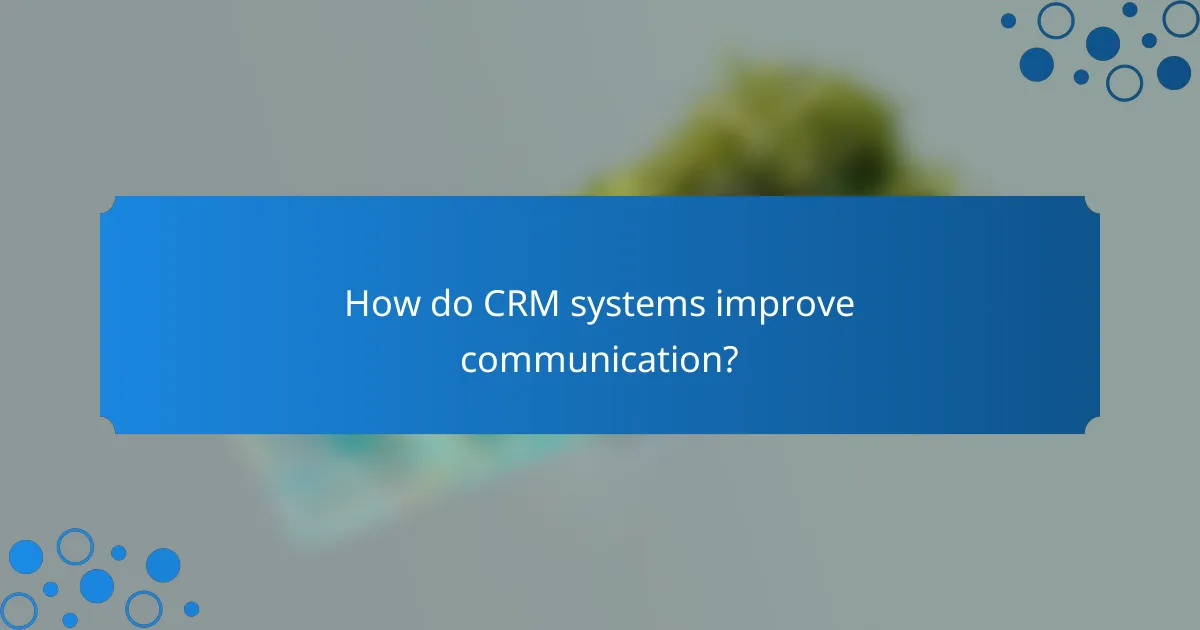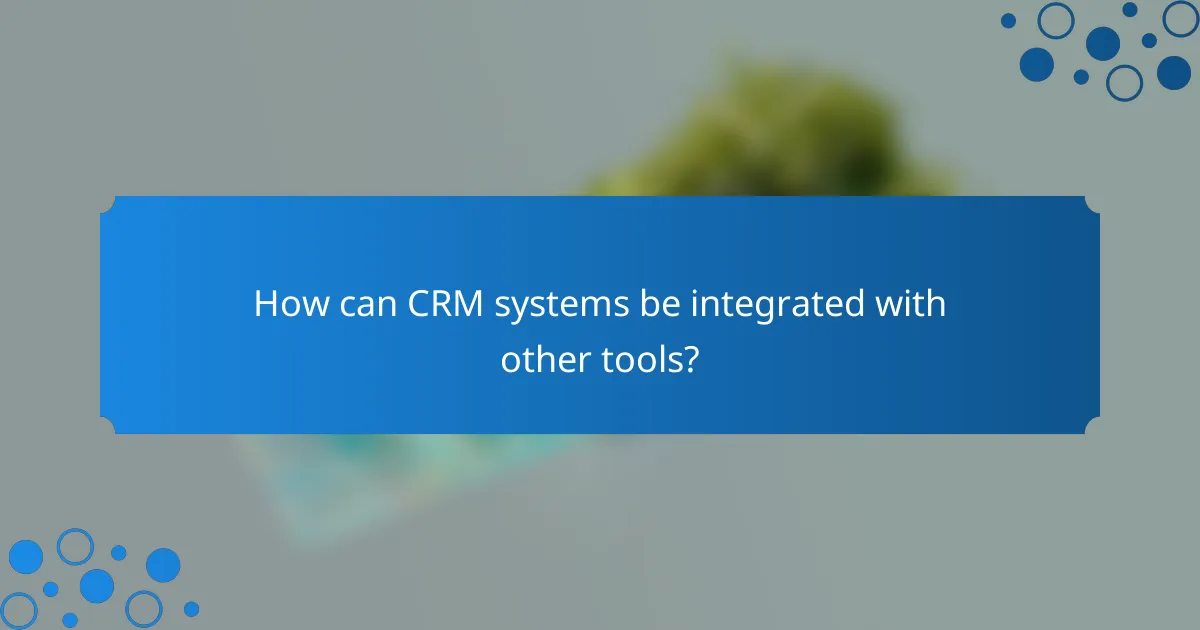Customer Relationship Management (CRM) systems are essential for gaining better customer insights, streamlining communication, and enhancing sales tracking. By centralizing customer information and automating interactions, these tools facilitate effective engagement and improve overall satisfaction. Leading CRM platforms like Salesforce, HubSpot, and Zoho offer features that empower businesses to monitor sales processes and optimize their customer relationships.

What are the best CRM tools for customer insights in the UK?
The best CRM tools for customer insights in the UK include Salesforce, HubSpot, Zoho, Microsoft Dynamics 365, and Pipedrive. These platforms offer various features that enhance customer understanding, streamline communication, and improve sales tracking.
Salesforce CRM
Salesforce CRM is a leading platform known for its robust analytics capabilities and customizable dashboards. It allows businesses to gain deep insights into customer behavior and preferences through data-driven reports.
Consider Salesforce if your business requires extensive integration options and scalability. It is particularly beneficial for larger organizations that need to manage complex customer relationships.
HubSpot CRM
HubSpot CRM is user-friendly and offers a free tier, making it accessible for small to medium-sized businesses. It provides tools for tracking customer interactions and managing sales pipelines effectively.
This platform excels in inbound marketing features, allowing users to analyze customer engagement and optimize communication strategies. HubSpot’s integration with other HubSpot tools enhances its functionality.
Zoho CRM
Zoho CRM is known for its affordability and comprehensive feature set, including sales automation and analytics. It offers customizable modules that cater to various business needs, making it suitable for diverse industries.
Businesses can leverage Zoho’s AI-driven insights to enhance customer engagement. Its competitive pricing makes it a popular choice among startups and small businesses in the UK.
Microsoft Dynamics 365
Microsoft Dynamics 365 combines CRM and ERP capabilities, providing a holistic view of customer interactions. Its integration with Microsoft Office tools enhances productivity and collaboration within teams.
This platform is ideal for organizations already using Microsoft products, as it offers seamless connectivity and data sharing. Dynamics 365 also provides advanced analytics for better decision-making.
Pipedrive
Pipedrive is a sales-focused CRM that emphasizes pipeline management and sales tracking. Its visual interface makes it easy to manage leads and monitor sales activities effectively.
Consider Pipedrive if your primary goal is to improve sales processes. It is particularly beneficial for small sales teams looking for straightforward tools to enhance their performance and customer insights.

How do CRM systems improve communication?
CRM systems enhance communication by centralizing customer information, automating interactions, and facilitating multi-channel engagement. This leads to more effective exchanges between businesses and customers, ultimately improving relationships and satisfaction.
Centralized customer data
Centralized customer data allows businesses to store and access all relevant information in one place. This includes contact details, purchase history, and interaction logs, which can be easily retrieved by team members. Having a single source of truth reduces miscommunication and ensures everyone is on the same page.
For example, a sales representative can quickly view a customer’s previous interactions before making a call, leading to more personalized conversations. This approach can significantly enhance the customer experience and increase the likelihood of successful sales.
Automated follow-ups
Automated follow-ups streamline communication by sending timely reminders and messages without manual intervention. This feature ensures that no customer inquiries or leads are overlooked, which is crucial for maintaining engagement. Automated systems can trigger emails or notifications based on specific customer actions or timelines.
For instance, if a customer signs up for a newsletter, an automated system can send a welcome email followed by a series of follow-up messages over the next few weeks. This consistent communication helps nurture leads and keeps the brand top-of-mind.
Multi-channel communication
Multi-channel communication enables businesses to interact with customers across various platforms, such as email, social media, and live chat. This flexibility allows customers to choose their preferred method of communication, enhancing their overall experience. CRM systems can integrate these channels, providing a seamless communication flow.
For example, a customer might initiate a chat on a website and later follow up via email. A well-integrated CRM ensures that all interactions are logged and accessible, allowing for a coherent conversation regardless of the channel used. This capability can significantly improve customer satisfaction and loyalty.
![]()
What features enhance sales tracking in CRM?
Key features that enhance sales tracking in CRM include sales pipeline management, performance analytics, and lead scoring. These tools help businesses monitor their sales processes, evaluate team performance, and prioritize leads effectively.
Sales pipeline management
Sales pipeline management allows businesses to visualize and manage the stages of their sales process. By tracking leads through various stages—from initial contact to closing a deal—companies can identify bottlenecks and optimize their strategies.
Effective pipeline management often involves setting clear criteria for each stage, which can help sales teams focus their efforts on leads that are more likely to convert. Regularly reviewing the pipeline can lead to improved forecasting and resource allocation.
Performance analytics
Performance analytics in CRM systems provide insights into sales team effectiveness and overall sales performance. By analyzing metrics such as conversion rates, average deal size, and sales cycle length, businesses can identify strengths and weaknesses in their sales approach.
Utilizing dashboards and reports can help sales managers make data-driven decisions. For instance, tracking performance over time can reveal trends that inform training needs or highlight successful strategies worth replicating.
Lead scoring
Lead scoring is a method used to rank prospects based on their likelihood to convert into customers. By assigning scores based on criteria such as engagement level, demographic information, and past interactions, sales teams can prioritize their outreach efforts.
Implementing a lead scoring system can significantly enhance efficiency, as it allows sales representatives to focus on high-potential leads. Regularly revising scoring criteria ensures that the system remains aligned with changing market conditions and business goals.

What are the key criteria for selecting a CRM?
When selecting a Customer Relationship Management (CRM) system, focus on integration capabilities, user interface simplicity, and scalability for growth. These criteria ensure that the CRM meets your business needs and can adapt as your organization evolves.
Integration capabilities
Integration capabilities refer to how well the CRM can connect with other software tools your business uses, such as email platforms, marketing automation, and accounting systems. A CRM that offers robust integration options can streamline processes and enhance data flow across departments.
Look for CRMs that support popular applications and offer APIs for custom integrations. This flexibility can save time and reduce errors by automating data transfers between systems.
User interface simplicity
A user-friendly interface is crucial for ensuring that your team can adopt the CRM quickly and efficiently. A simple, intuitive design minimizes training time and encourages consistent use among employees.
When evaluating CRMs, consider conducting a trial to assess the interface. Features like drag-and-drop functionality and customizable dashboards can significantly enhance user experience and productivity.
Scalability for growth
Scalability is the ability of a CRM to grow alongside your business. As your customer base expands, your CRM should accommodate increased data and user demands without sacrificing performance.
Choose a CRM that offers tiered pricing plans or modular features, allowing you to add functionalities as needed. This approach ensures you are not paying for unnecessary features while still having the option to scale up when required.

How can CRM systems be integrated with other tools?
CRM systems can be integrated with various tools to enhance functionality and improve data flow. This integration allows businesses to streamline operations, improve customer insights, and facilitate better communication across departments.
Integration with email platforms
Integrating CRM systems with email platforms enables seamless communication with customers. This connection allows for automatic logging of email interactions, which helps maintain a comprehensive customer history.
When considering integration, look for features like email tracking, automated responses, and personalized messaging. Popular email platforms such as Gmail and Outlook offer APIs that can be utilized for smooth integration.
Integration with marketing automation tools
Linking CRM systems with marketing automation tools enhances lead management and campaign tracking. This integration allows businesses to nurture leads based on their interactions and behaviors, leading to more targeted marketing efforts.
Key features to consider include automated lead scoring, segmentation, and personalized content delivery. Tools like HubSpot and Marketo can work effectively with CRM systems to optimize marketing strategies.
Integration with e-commerce platforms
Integrating CRM systems with e-commerce platforms provides valuable insights into customer purchasing behavior. This connection allows businesses to track sales, manage inventory, and analyze customer preferences in real time.
When integrating, focus on features such as order tracking, customer segmentation, and personalized recommendations. Platforms like Shopify and WooCommerce offer integration options that can enhance the overall customer experience.

What are the emerging trends in CRM technology?
Emerging trends in CRM technology focus on enhancing customer insights, improving communication, and optimizing sales tracking. These advancements leverage data analytics, artificial intelligence, and automation to provide businesses with a competitive edge in understanding and serving their customers.
AI-driven insights
AI-driven insights in CRM systems utilize machine learning algorithms to analyze customer data and predict behaviors. This technology helps businesses identify trends, personalize marketing efforts, and enhance customer engagement by providing tailored recommendations based on past interactions.
For example, AI can segment customers based on purchasing patterns, allowing companies to target specific groups with customized offers. Businesses can expect to see improved conversion rates and customer satisfaction when implementing AI-driven insights effectively.
When adopting AI-driven insights, companies should ensure they have clean, comprehensive data to train their models. Regularly updating algorithms and monitoring their performance is crucial to maintain accuracy and relevance in customer insights.